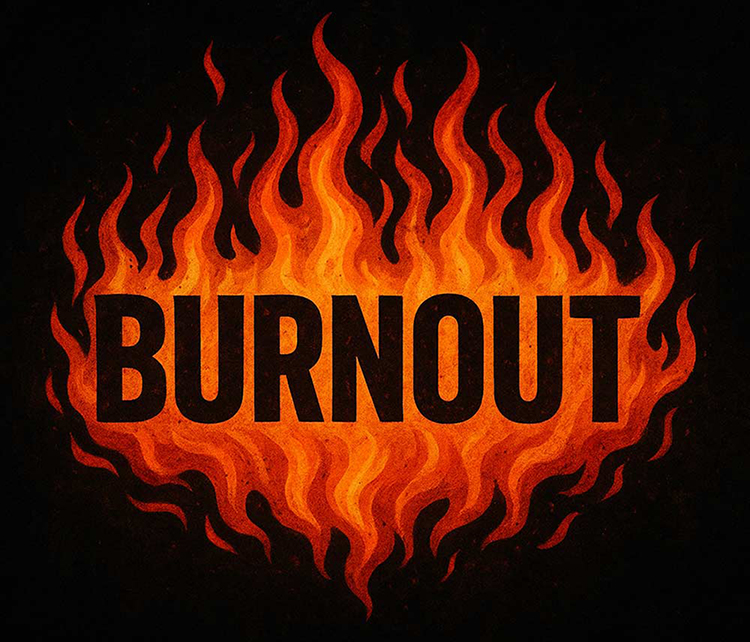
It can be challenging to define burnout. Not considered to be a medical condition, the definition of burnout, as stated by the APA Dictionary of Psychology, is “physical, emotional or mental exhaustion, accompanied by decreased motivation, lowered performance and negative attitudes towards oneself and others.”
What is burnout?
Typically, burnout is brought on by drawn out or chronic stress, resulting in mental, physical or emotional fatigue. You know that it is happening when you experience emotional exhaustion, feel overwhelmed and are not able to handle ongoing responsibilities. Consider all of those responsibilities that you have in your personal and professional life. Although issues at work are the primary cause, it can also affect other facets of life including parenting, caring for others, and intimate relationships.
Burnout is a type of fatigue brought on by a constant feeling of being overwhelmed. It can occur when you are emotionally depleted, overburdened, and unable to keep up with life’s daily demands. Burnout has a detrimental impact on all aspects of life, affecting your home, job, and social life. It can drain your energy, leaving you feeling like you have nothing left to give.
Is it burnout or stress?
Stress is a normal reaction to regular or unusual stresses. It can occasionally last for a prolonged period and develop into a chronic condition. Burnout could result from this, although not necessarily. Being under constant stress doesn’t necessarily indicate that a person is being burned out.
People who lead stressful lives may experience enormous strain to the point of feeling drained, burned out, and not able to cope. Mental, physical and emotional difficulties might also be caused by stress at work. Possible contributing factors include feeling constantly overworked, continually dealing with deadlines, or having disputes with coworkers. A strong commitment to the job to the point of disregarding their own needs can also be to blame.
Many people use the words “stress” and “burnout” interchangeably. Although they can be similar, there are some significant differences. For example, stress related to a specific incident is something we all experience occasionally in life.
In contrast, burnout is a reaction to prolonged, extreme stress and results in a person feeling emotionally and physically exhausted, disillusioned, disengaged, and less effective. Burnout can lead to mental health problems including severe depression if it is not treated.
Burnout is the result of unmanaged and accumulated stress over time. Consider burnout to be the bigger, meaner big brother of stress. Generally, burnout needs stress to be present, but stress can exist without being burned out.
How is burnout different from depression?
Depression has some of the same symptoms of burnout, including fatigue, being despondent, and poor performance. Depression frequently manifests as a low sense of self-worth, feeling hopeless, and having suicidal thoughts. These are not considered to be the normal signs of burnout. Depression does not always accompany burnout. However, burnout may make someone more susceptible to developing depression.
Are you at risk for burnout?
Let’s take a reality check. Some predictors of burnout are if you:
- Feel as though you never have a good day
- Share an opinion that what you are doing is not worth the effort
- Suffer consistently by being too tired to do anything
- Consider the tasks you have to complete at work are mind-numbingly boring or overwhelming
- Think that nothing you do is worthwhile
- Sense that no one appreciates all the work that you do
- Are experiencing a loss of motivation
Burnout symptoms

It’s no secret that getting out of bed in the morning is not the easiest task of the day. Most of us experience days when we struggle to get out of bed. Although your pillow may be filled with down and your comforter is warm and cuddly, the effort could be due to being overwhelmed or unappreciated, whether at home or at work.
Burnout develops gradually. Like obesity, vision problems or back aches, it can take time to develop as it slowly sneaks up on you. At first, the symptoms and signs are minimal, but they get worse over time.
Consider the early signs as warnings indicating something is wrong and has to be remedied. You can avoid a serious breakdown if you pay attention and properly manage your stress. Ignoring the signs can lead to burn out.
Emotional symptoms
- Feeling of failure and insecurity
- Feeling defeated, stuck, and helpless
- Feeling alone and detached from everything
- No motivation
- A more pessimistic and cynical view
- Diminished sense of accomplishment and life satisfaction
Your emotional wellbeing can be impacted contributing to an increased likelihood for depression, anger, irritability and anxiety.
Physical symptoms
- Most of the time feeling worn out and exhausted
- Sick often, weakened immunity
- Pain in muscles, recurring headaches
- Change in eating habit
- Change in sleeping habits that bring about fatigue
Physical wellness is impacted by burnout due to the excessive stress in your body. Your physical wellbeing can be impacted contributing to an increased likelihood for heart disease, high blood pressure, type 2 diabetes, respiratory issues, and likelihood for death before age 45.
Cognitive symptoms
- Difficulty paying attention when someone speaks
- Difficulty concentrating on a task
- Impaired short-term memory
- Impaired judgement
Your cognitive wellbeing can be impacted contributing to an increased likelihood for making mistakes at work and poor motor coordination.
Behavioral symptoms
- Withdrawing from personal and professional obligations
- Excluding significant others from your life
- Putting things off or taking longer to do them
- Using coping mechanisms like alcohol, drugs, or food
- Taking frustration and anger out on others
- Not going to work or working shorter hours
Your behavioral or social wellbeing can be impacted contributing to an increased likelihood for alcohol or substance abuse, isolation from friends and family, irresponsibility with finances, anger towards family members and inability to fulfill responsibilities. Professionally, you may experience a loss of job satisfaction, an inability to do your job well, or withdraw from colleagues.
How to Recover from Burnout
We have another article on this site that covers ways to recover from burnout when you are exhibiting some of the symptoms mentioned above. Briefly, they include:
- Addressing your mental health
- Taking breaks throughout the day, especially when you are at work
- Exercise on a regular basis
- Find things to do that you enjoy
It is possible to recover from burnout, even though you may feel completely overwhelmed. It takes some effort and planning to create healthy habits, a good daily routine, and maintain boundaries so that you can be successful both at work and in your personal life.
Barbara is a leading authority and best-selling author on managing burnout, secondary traumatic stress, compassion fatigue, and vicarious trauma. As a nationally recognized keynote speaker, she motivates audiences to build their resilience and create work-life balance. Her programs help leaders and teams manage workplace chronic stressors and get over burnout at work.
Barbara's newest book, "But I Didn't Say Goodbye: Helping Families After a Suicide", is available now on Amazon - https://amzn.to/2FwS6JI
• Three weeks prior to giving birth to triplets, her father died by suicide. Her story was featured in the Emmy award winning documentary, Fatal Mistakes, Families Shattered by Suicide narrated by Mariette Hartley. Many employees are grieving personal loss. She offers programs for leaders on lost productivity and performance while managing grief at work.
• As a sought-after keynote speaker who has presented to over 500 groups since 1991, including corporations, state and national associations and non-profit organizations, Barbara offers work-life balance strategies for leaders to implement right away. With clarity and humor, her speaking engagements are designed to give audiences powerful and practical strategies of work-life balance, wellbeing, and self-care that can be implemented immediately.
• Barbara is a Board-Certified Expert in Traumatic Stress and Diplomate with the American Academy of Experts in Traumatic Stress. She received a Bachelor of Science in psychology and a Master of Arts degree in community health, with a concentration in thanatology, both from Brooklyn College.
Email: BarbaraRubel@GriefworkCenter.com
Website: www.barbararubel.com





